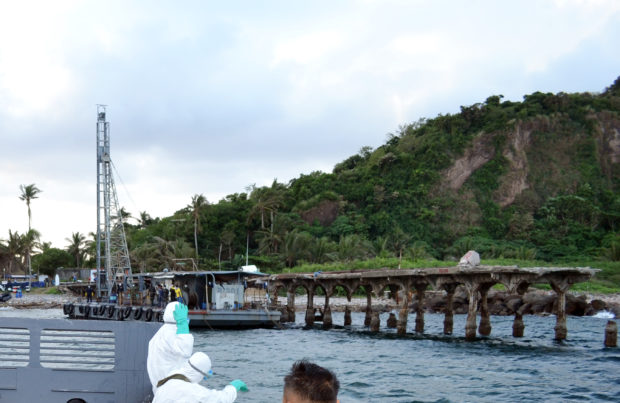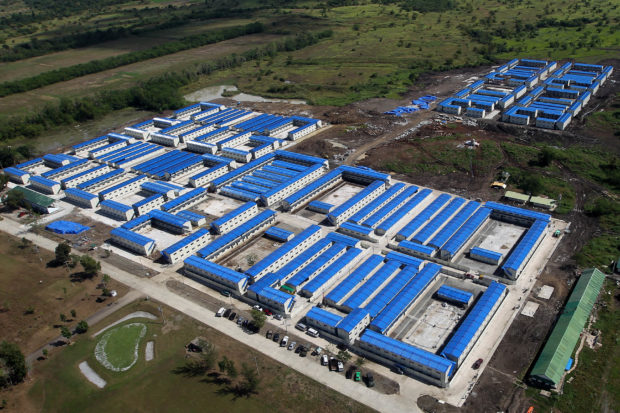Island, drug rehab camp eyed as quarantine sites
MANILA, Philippines — Officials on Saturday said they were considering holding Filipinos returning from China in quarantine either at a largely unused drug rehabilitation camp inside a military reservation or on an island in Manila Bay as more legislators pressed the government to ban all travelers from everywhere in China.
According to Health Secretary Francisco Duque III, around 40 to 50 Filipinos will be repatriated on a chartered flight at government expense from the Chinese city of Wuhan, the capital of Hubei province and the epicenter of the novel coronavirus (2019- nCoV) outbreak in December.
“We cannot hamper the desire of our people in Wuhan to come home,” Duque said in a radio interview on Saturday. “What we should do is to facilitate it, but subject to the quarantine measures that they should go under, and that’s for 14 days.”
For DOH inspection
Defense Secretary Delfin Lorenzana said Caballo Island off Cavite province, now being used as a naval base, and the 10,000-bed Mega Drug Abuse Treatment and Rehabilitation Center at Fort Magsaysay in Nueva Ecija province were to be inspected by the Department of Health (DOH) as possible quarantine sites.
“They (DOH) are looking at both areas. No decision yet,” Lorenzana said in a Viber message to reporters on Saturday.
He said some health officials on Friday visited Caballo, a 1.2-kilometer (km) long, banana-shaped island at the mouth of Manila Bay, about 9 km from Ternate town in Cavite. The drug rehabilitation facility will be inspected on Saturday, he added.
Article continues after this advertisement
TWO OPTIONS Defense Secretary Delfin Lorenzana on Saturday said Caballo Island off Cavite province (bottom), now being used as a naval base, and the 10,000- bed Mega Drug Abuse Treatment and Rehabilitation Center at Fort Magsaysay in Nueva Ecija province were to be inspected by the Department of Health for possible use as quarantine areas for Filipinos returning from China due to the novel coronavirus outbreak. —PHOTOS FROM MALACAÑANG, PHILIPPINE NAVY
Caballo was first used as a quarantine area for about 130 soldiers and police officers who returned to the country in 2014 after their stint as UN peacekeepers in Liberia, which was hit by the deadly Ebola virus.
“Any person, except Filipino citizens and holders of permanent resident visas issued by the Philippine government, coming from Hubei province as well as other places in China where nCoV-ARD has spread, as officially confirmed by the Chinese government, will be temporarily banned from entering the Philippines,” Duque told reporters earlier.
The ban on travelers from Hubei and other affected areas, approved by President Duterte this week, should be widened to cover the whole of China to keep Filipinos safe from the novel coronavirus, several senators said on Saturday.
The urgent call comes just days after the Philippines reported its first case of the nCoV, a 38-year-old woman who visited Cebu from Wuhan via Hong Kong, and the World Health Organization declared the outbreak a global health emergency.
Sen. Aquilino Pimentel III noted that the 2019- nCoV cases were no longer confined to Hubei province and that despite the lockdown on Wuhan, some residents of the city were able to move to other parts of China.
“We must impose a travel ban on arrivals from China. This is not because we’re discriminating against them. This is to protect our welfare,” Pimentel said.
‘Ban not just the Chinese’
“We can tell the Chinese that when the nCoV virus is gone, the Philippines would still be here and they can visit then,” he said.
Senate President Vicente Sotto III also supported a total ban on travelers from China but stressed that it should cover not just Chinese but all nationalities.
“Flights from China do not only have Chinese people aboard,” he said in a statement. “There are other nationalities on these flights and they, too, should be barred from entering our country. The virus does not discriminate whom it will affect.”
The Philippines should not take the matter lightly because anyone can catch the virus without knowing it, he added.
Senate Majority Leader Juan Miguel Zubiri said such a measure had been taken by many other countries, including Singapore, Mongolia, North Korea, Pakistan, Italy, Israel, Australia, and the Caribbean countries of Dominican Republic, Jamaica, and Trinidad and Tobago.
“There are confirmed cases all over China, we need to take that in mind,” Zubiri said in a statement. “A temporary China-wide travel restriction is a necessary precautionary measure. We already have one confirmed case, after all. We cannot afford more.”
He believes this would not strain ties between Manila and Beijing since China will understand the need to control the spread of the virus.
He added that as a “goodwill gesture,” the government could extend the visas of Chinese visitors who are already in the country and who don’t want to go home for fear of getting infected.
Sen. Ronald Dela Rosa also supported banning everyone traveling from China “so that we can be sure” to keep the virus out.
Earlier, Sen. Risa Hontiveros called for a China-wide 30-day travel ban, while Sen. Joel Villanueva sought travel restrictions to and from China.
Sen. Francis Pangilinan said the government should deny visas to visitors from Wuhan and other areas in China where the virus had spread.
Stringent screening
Sen. Richard Gordon, chair of the Philippine Red Cross, said all travelers from China should be subjected to more stringent screening measures as a general rule, while those from Hubei should be barred entry.
Gordon also said that if all countries impose a travel ban, people’s livelihood could suffer.
People’s health should be the priority, so actions should be calibrated, he said.
Opposition Rep. Edcel Lagman said the President’s decision to ban travelers only from Wuhan and Hubei was not enough and all flights from “the entire Chinese mainland, including Hong Kong,” should be canceled.
“The health and safety of Filipinos must be paramount over diplomatic niceties, tourism revenues, and income of Philippine airline companies,” he said in a statement.
The country’s two biggest airlines, Philippine Airlines and Cebu Pacific must suspend all flights to and from China and Hong Kong, he said.
“They should stop servicing selective Chinese destinations and put on hold the current policy of merely reducing flight frequency,” Lagman said. In addition, he said, government should also halt the arrival of tourists from China on board cruise ships and other vessels.
Lorenzana did not provide details on how the planned quarantine for the Filipinos returning from Wuhan would be carried out.
Duque earlier said they were to be repatriated on Feb. 8 on two chartered flights.
He said the climate of the location of the quarantine facility would be a crucial consideration since the nCoV was harder to kill in cold and dry places as it thrives in low temperatures and low humidity.
